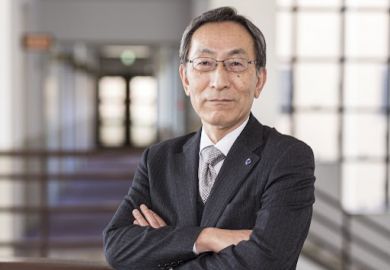As two of Japan’s leading universities complete a historic merger, the president of the new institution hopes it will “serve as a model for other Japanese universities” grappling with funding challenges and the consequences of a rapidly ageing population.
The Institute of Science Tokyo (Science Tokyo) opened its doors at the beginning of October, following a merger between Tokyo Medical and Dental University and the Tokyo Institute of Technology (Tokyo Tech).
Newly appointed president Naoto Ohtake described the merger, which had been in the works for two years, as a “strategic decision” to “boost our financial base and ensure sustainable operations”.
In recent months, Japanese universities have spoken out about the financial problems they are facing, with the Japan Association of National Universities (JANU) claiming that government funding cuts and high inflation are pushing institutions to crisis point.
These issues are exacerbating the troubling impact of demographic changes on the country’s universities. Earlier this year, a government task force forecast that the number of university entrants will decrease from 630,000 in 2023 to an estimated 510,000 in 2040.
While smaller, private institutions are expected to be more affected than Japan’s leading public universities, Professor Ohtake, who formerly ran Tokyo Tech’s Institute of Innovative Research, believes the entire sector will need to adapt.
“In a rapidly changing global society, universities sometimes need to redefine their role and evolve,” he said.
“Integration is…an effective strategy for many universities to address the practical issues of financial changes and ageing populations and declining birth rate.
“I hope that the founding of Science Tokyo – our birth – will serve as a model for other Japanese universities that seek a more sustainable future.”
Politically, Japan is going through an unusually turbulent time. Professor Ohtake spoke to Times Higher Education days after a snap general election in which the governing party unexpectedly lost its majority and, at the time of writing, was scrambling to form a ruling coalition.
However, for universities, the election result might have less impact than one would expect, primarily because there is little expectation that any leading party will make a significant intervention to support the higher education sector financially.
And so, Professor Ohtake is following his own advice and adapting. At Science Tokyo, a new financial strategy outlines how the institution will rely less on central funding and tuition fees, including plans to better monetise university research while expanding fundraising.
Another way Professor Ohtake hopes to secure more investment is through the government’s existing research excellence fund.
The scheme, announced in 2022, gives eligible universities access to an endowment fund to strengthen their research and innovation. So far, only Tohoku University has been approved, as other institutions have struggled to live up to seemingly ambitious government requirements.
However, Professor Ohtake said Science Tokyo will apply to the scheme, with three new research institutes set to be created forming the thrust of the institution’s bid. The university also plans to expand its international outreach, recruiting more students from the Asean region and targeting key countries such as India.
Despite the concerns facing Japan’s higher education sector, Professor Ohtake was optimistic. “Japan’s declining birth rate and ageing population may indeed lead to a decline in the number of students in the Institute of Science Tokyo or other universities, but the importance of higher education will not change,” he said.
“As the population declines, the development of highly skilled professionals becomes increasingly important.”




